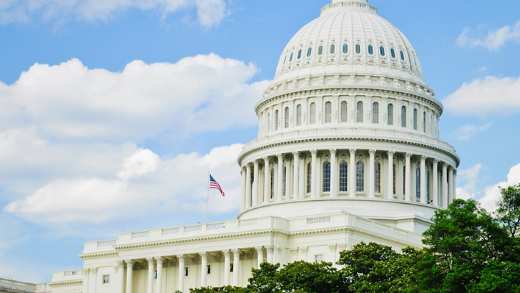Ask The Fund Manager - Tariffs: A New World Disorder
US trade tariffs have had the world on its toes over the last 10 days - from historic market sell-offs to historic daily surges.
Listen in while Dean Cook and Nicole Lowe discuss the latest in tariffs.
Transcript for video Tariffs: A new world disorder
[00:00:00.21] - Nicole Lowe
Tariffs. Where do we even begin? It's changing from day to day. Markets are reeling, and the penguins on the McDonald Islands are still furious that their 10% tariffs remain. Today, I'm joined by Portfolio Manager Dean, where we will look at the latest rollback we've just seen on the tariff levy by President Trump, the response from markets and countries so far, and what we might expect from here. Now, bear in mind, we are recording this on Thursday, the 10th of April, and this could take a whole other plot twist by the time we release it on Friday. Dean, let's start first with markets and the bounce. What just happened?
[00:00:40.08] - Dean Cook
Thanks, Nicole. The S&P 500 finished up nearly 10% yesterday in the index's best return since 2008, on the news and announcement from President Trump that he was pausing tariffs for 90 days. What that means is that countries will pay a 10% baseline tariff, except for China. And that gives everybody time to negotiate trade deals with America. When the tariffs were first announced back on the second of April, most had either expected either blanket tariffs at a reasonable level or targeted sectoral and regional tariffs, depending on the trading relationship. Instead, we got both. That exceeded market expectations and triggered a major sell-off across most asset classes. In fact, it wiped nearly $10 trillion off of global stock markets. Bond markets were an interesting one. They actually sold off on the news, particularly around the US. Ten-year US Treasury yields got to about 4.5%, and we think this was a leading factor in why Trump and company decided to hit the pause button for now. Since the announcement, 10-year US Treasury yields are down, something around 20 basis points. Gold is usually a safe haven asset at times like this. That's saw some interesting volatility.
[00:01:57.21] - Dean Cook
Interestingly, we suspect that potentially investors were having to sell lots of things in their portfolios rather than just the things they wanted to, and potentially gold got caught up in this. But the price is still up about 18% since January despite the tariff.
[00:02:11.28] - Nicole Lowe
It appears with all this that Trump is trying to get countries to the negotiation table. The US Treasury Secretary has said that over 70 countries are looking to negotiate trade deals so far. How have countries reacted to the tariffs announced last week?
[00:02:28.08] - Dean Cook
There's quite a range, interestingly, and now we're on the pause button. I suspect that it will become all about the negotiations. At one end, you've got countries like Japan who took, say, an appeasement route to the negotiations. They haven't publicly decried them as unfair or anything, and they went straight to the negotiation table and have managed to get themselves, say, a front row seat or certainly, priority. The US has even reaffirmed Japan as a key military and economic ally. You can see that that approach seems to be paying off. The very other end of the spectrum, you've got China. They've dug in and have started retaliating. I shant chart all of the counter tariffing that's gone back and forth between the two regions. But suffice to say, we're now at 125% on Chinese goods imported into the US. It's difficult at the moment, though not impossible, to see a climbing down here from the world's top two economies. Europe had been on a retaliatory tack for a while, but has since seen the successes potentially that Japan and the like have gone on, and they're certainly looking for a negotiation and ways to bring down the ultimate tariff rate.
[00:03:35.19] - Dean Cook
I think ultimately, we can expect to see countries exploring opportunities to diversify their trading relationships beyond the US.
[00:03:43.22] - Nicole Lowe
Absolutely. Probably seeing some certainly trade reordering among various regions. Now, the million dollar question, Dean, where do we see things going from here?
[00:03:54.14] - Dean Cook
The range of outcomes clearly is quite broad, and it slightly depends on the nature of the relationship that the US wants to have with the rest of the world. Does it want to use tariffs as an opportunity to raise a little bit of revenue, fund some tax cuts back home, and generally make good on some political and presidential race promises? Or the other end of the spectrum, does the US want to cut itself off completely from the rest of the world? Now, it's potentially unlikely that that latter scenario is the one that we're going for, but certainly markets have been starting to price in more of that scenario. Somewhere in the middle would be that the US wants to strategically decouple from a country like, say, China, and therefore bring some manufacturing that is currently done there back home in order to ensure that they can still have access to those sorts of products. The important thing here is to follow each of these negotiations and ensure that we understand what it is that's going through the minds of as many of the policymakers as we can.
[00:05:00.13] - Nicole Lowe
So Wednesday's 90 day tariff pause has provided some relief to markets and some recessionary relief, I guess we'd say, but there are still clearly unknowns and unpredictability, as you say. So we remain on our toes. Thank you, Dean. Thank you all for watching, and join us again soon for another topic that's caught our eye.
The Aviva Investors Multi-Asset Team




